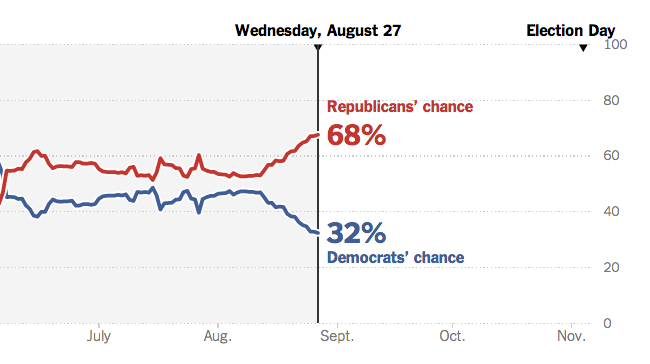The polls have generally drifted away from the Democrats over the last month or so, but there’s one exception: Georgia.
Michelle Nunn and her Republican opponent, David Perdue, were already locked in an extremely tight race, but many analysts played down her chances because she needed to reach 50 percent of the vote to avoid a runoff in which turnout and her prospects would be more uncertain.
Ms. Nunn’s chances of winning outright on Nov. 4 have since improved markedly. A few weeks ago, it was revealed that Mr. Perdue, a business executive, said in a deposition that he was proud of his record of outsourcing. Mr. Perdue has struggled in the polls since.
Four of the last five surveys has shown Ms. Nunn with an advantage. This morning, a CNN/ORC poll showed Ms. Nunn ahead by three percentage points; another poll, from The Atlanta Journal-Constitution/SRBI, showed Mr. Perdue ahead by two points. All of the recent polls show her well beneath the 50 percent she needs to avoid a January runoff, but if she leads by two or three points, she would have a real shot to win outright.

The most important variable is the minor party vote. For Ms. Nunn to break 50 percent, she needs to top Mr. Perdue by a margin equal to or exceeding the number of votes won by the Libertarian candidate Amanda Swafford. Polls show Ms. Swafford has been attracting about 4.5 percent of the vote, which would make an outright Nunn victory very challenging.
Georgia Election Preview »
But Ms. Nunn’s odds might be a little better than the polls suggest. If Ms. Swafford were to win 4.5 percent of the vote, it would be a rare showing by a Libertarian candidate in Georgia.
In Senate contests since 2002, minor party candidates have attracted 2.7, 3.4, 2.1 and 1.4 percent of the vote. My guess is that Ms. Swafford’s share of the vote is likelier to finish in this range. There’s a fairly long history of polls overestimating the support of minor party candidates; many supporters don’t wind up voting, and others drift to the main candidates. The CNN poll showed Ms. Nunn’s lead growing in a two-way race.
Ms. Nunn is not at all assured of winning by the margin needed to clear a runoff. Perhaps the most reliable of the recent polls, the one from The Atlanta Journal-Constitution/SRBI, still shows Ms. Nunn trailing. But for the first time this year, a Nunn win on Nov. 4 seems like a distinct possibility.





